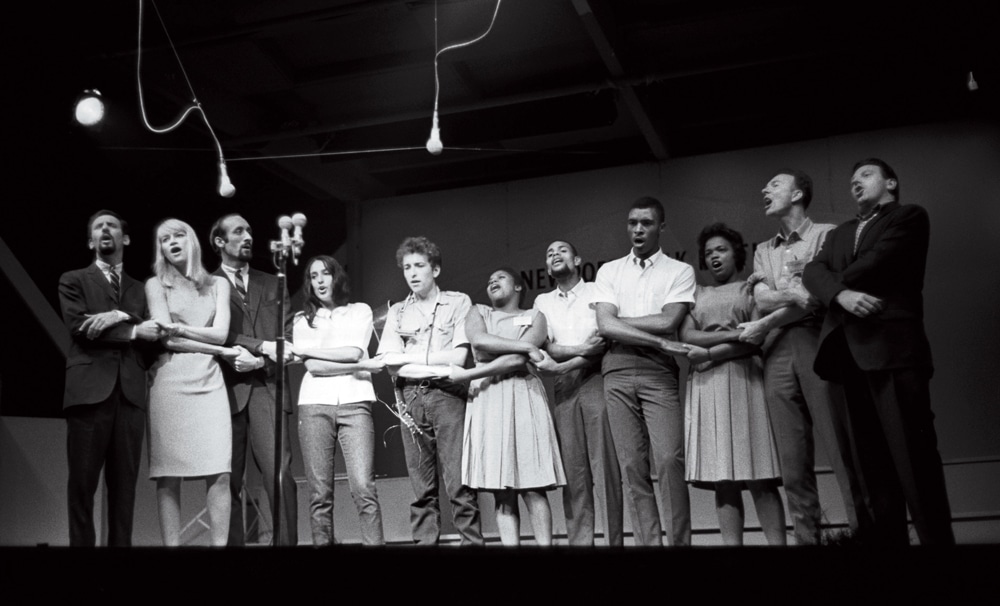Folk Heroes | The Newport Folk Festival Turns 60
A conversation with one of the creators of the Newport Folk Festival reveals the power of music to knock down walls.

From the start, the Newport Folk Festival has welcomed artists that were barred from other venues due to race, sexual orientation, or politics. In a memorable moment at the end of the 1963 festival, performers united for a group sing of “We Shall Overcome.” from left: Peter, Paul, and Mary; Joan Baez; Bob Dylan; the Freedom Singers; Pete Seeger; and Theodore Bikel.
Photo Credit : John Byrne Cooke
Photo Credit : John Byrne Cooke
A lot of musical history has happened at the Newport Folk Festival, which began 60 years ago this July.There was the “We Shall Overcome” performance in 1963, at the height of the civil rights movement, and Bob Dylan defiantly “going electric” amid boos in 1965. I’m not the only one who has dozens of stories from the dusty fields of Fort Adams. But the moment that never leaves me happened in the Manhattan apartment of festival cofounder George Wein.
We’d spent a long day in 2009 talking for a series I was writing for the Providence Journal to celebrate the festival’s 50th anniversary, and we were beginning to wind down. But there was still something I wanted to ask him—something I wanted to hear from him on the record.
At the 1964 festival, as Wein detailed in his memoirs, an all-white Sacred Harp singing group from Alabama was heading to their stage on a full bus when it stopped to let on the all-black Georgia Sea Island Singers. It had been only nine years since Rosa Parks and the Montgomery bus boycott. The two groups looked at each other along the aisle of the bus; then, the Sacred Harp singers stood and gave their seats to the Sea Islanders.
“Many beautiful things like that happened,” Wein said.
“You knew what you were doing,” I said.
There was a pause. “Oh yeah—that was intentional,” he said. “I can’t say we were color-blind.” And then the floodgates opened.
Wein told me about his marriage to Joyce Alexander, which was illegal in 24 states at the time because he was white and she was black; about the musicians who would play together at Newport but couldn’t sit on the same porch back home; about how the philosophies behind his two most famous festivals, Newport Jazz and Newport Folk, constituted two ways of reaching the same goal. “The jazz festival was an instruction on how things could be if people worked together,” he said. “The folk festival was very political.”
And he told how his other signature creation, the New Orleans Jazz and Heritage Festival, took six years to come to fruition because city officials were—as he put it, with a laugh—“trying to figure out a way around their own laws,” which included prohibitions on “mixed” bands and audiences, as well as social mores that frowned on the Weins’ inter-racial marriage.
Wein recounted how, throughout his life, he wore people down with nothing but persistence, and worked from the inside.
“I never wanted to be a rebel. I never thought I was doing anything different by marrying Joyce. I wanted the same kind of respect my father had as a doctor. I wasn’t going to live an outsider’s life; I was part of society. And to this day I still am.
“And that’s why I’ve lasted all these years, I think. I don’t compromise, but at the same time I don’t tell anyone else they’re wrong. They have to find out that they’re wrong. And they’ll find out.”
He was 84 then. As I listened to him explain his ambitions and describe his steady, determined work, I was at the beginning of my midlife, a time when you begin to wonder whether you’re going to accomplish anything that lasts.
No one would put George Wein in with the front-line activists of the civil rights movement who risked life, limb, and freedom—least of all Wein himself. But that afternoon, I saw that working for change could include putting on music festivals. I saw that those who make phone calls and sign contracts and hassle with vendors and watch the money, they also serve. To ensure that their creation lives another year, and another, and another. To take a little kick against the wall, again and again and again.
The 60th annual Newport Folk Festival will be held July 26–28, 2019 at Fort Adams State Park in Newport, RI. Among the musicians scheduled to perform are Sheryl Crow, Lake Street Dive, Trey Anastasio, Jeff Tweedy, and Preservation Hall Jazz Band. Although all tickets have been sold, the festival offers a link to a fan-to-fan ticket exchange on its website, newportfolk.org.


